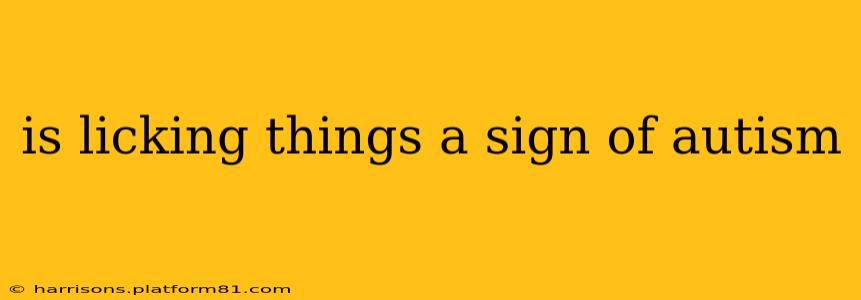Licking objects isn't inherently a diagnostic criterion for autism, but it can be a manifestation of sensory sensitivities often associated with the condition. Many autistic individuals experience the world differently, leading to unique sensory experiences and responses. While licking might seem unusual to neurotypical individuals, it's crucial to understand the underlying reasons behind such behaviors before drawing conclusions.
This article explores the connection between licking objects and autism, delving into the complexities of sensory processing and providing a balanced perspective. We'll also address common questions surrounding this topic.
What are Sensory Sensitivities in Autism?
Autism spectrum disorder (ASD) is characterized by differences in how individuals process sensory information. This can manifest as hypersensitivity (over-sensitivity) or hyposensitivity (under-sensitivity) to various stimuli, including touch, sound, sight, smell, and taste. Sensory sensitivities are highly individual, varying significantly in type and intensity from person to person.
For some autistic individuals, licking objects might stem from a desire for sensory input. They might seek out specific textures or tastes to self-regulate or provide a sense of comfort or grounding. The texture or taste of an object might provide a calming or stimulating sensation that helps manage overwhelming sensory experiences.
Why Might an Autistic Person Lick Objects?
Several reasons might explain why an autistic person might lick an object. These are not exhaustive but represent common scenarios:
-
Seeking Sensory Input: The texture, temperature, or taste of an object might provide a desired sensory experience lacking in their environment. This could be a way to self-stimulate and regulate sensory overload.
-
Exploring Textures and Tastes: Autistic individuals may exhibit intense curiosity about the world around them. Licking might be a way to explore and understand textures and tastes through direct sensory experience.
-
Coping Mechanism: Licking could serve as a coping mechanism for anxiety, stress, or discomfort. The repetitive action might provide a sense of calm or control.
-
Oral Sensory Seeking: Some individuals might have a heightened need for oral sensory input, leading to behaviors like licking, chewing, or mouthing objects.
Is Licking Objects Always a Sign of Autism?
No. Licking objects can occur in individuals without autism. While it can be a symptom associated with autism, it's not a defining characteristic. Many other factors can contribute to this behavior. A proper diagnosis of autism requires a comprehensive evaluation by a qualified professional considering various behavioral and developmental factors.
How Can I Determine If My Child's Licking Behavior Is Concerning?
If you're concerned about your child's licking behavior, consult a pediatrician or developmental specialist. They can assess the behavior within the context of your child's overall development and determine if further evaluation is needed. Important factors to consider include:
-
Frequency and Intensity: How often does the licking occur, and how intense is the behavior?
-
Other Behaviors: Are there other unusual sensory behaviors or developmental delays?
-
Context: When and why does the licking behavior occur?
-
Safety: Is the licking behavior putting the child at risk of ingesting harmful substances?
What Are Other Sensory Seeking Behaviors Associated With Autism?
Beyond licking, many other sensory-seeking behaviors are associated with autism, such as:
- Spinning: Repetitive movement to self-regulate.
- Hand flapping: A calming or stimulating self-stimulatory behavior.
- Rocking: Rhythmic movement to provide sensory input.
- Chewing on non-food items: A common form of oral sensory seeking.
Remember, understanding and addressing sensory sensitivities in autistic individuals requires patience, empathy, and professional guidance.
Conclusion
Licking objects can be associated with autism due to sensory sensitivities. However, it's crucial to understand that this behavior isn't diagnostic on its own. If concerned about a child's behavior, seek professional evaluation to determine the underlying cause and develop appropriate strategies. Empathy and understanding are essential in supporting individuals with autism and their unique sensory experiences. Remember, each autistic individual experiences the world differently, and their behaviors should be understood within the context of their individual needs and sensory preferences.
